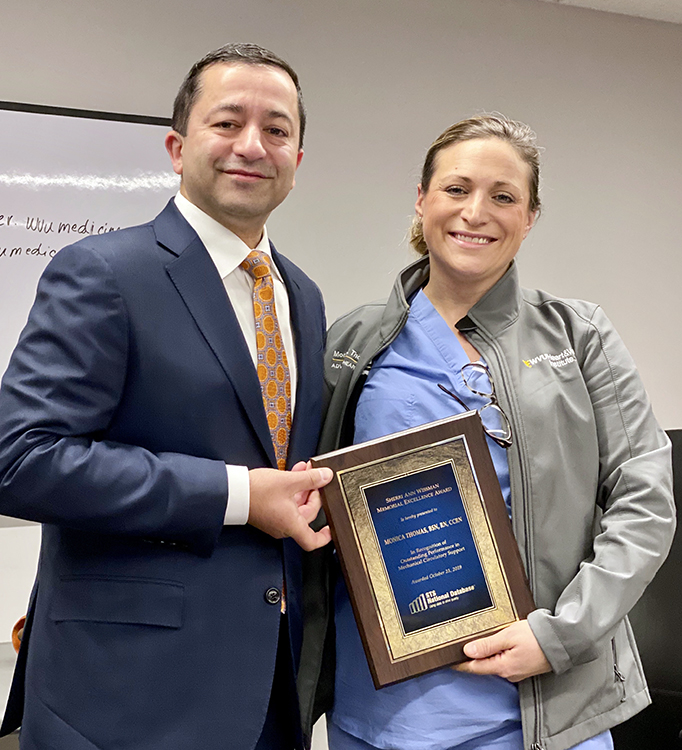WVU Heart and Vascular Institute VAD coordinator recognized by Society of Thoracic Surgeons

MORGANTOWN, W.Va. – Monica Thomas, R.N, B.S.N., WVU Heart and Vascular Institute ventricular assist device (VAD) coordinator, recently received the Society of Thoracic Surgeons (STS) National Database Sherri Ann Wissman Memorial Excellence Award, which recognizes and rewards an outstanding VAD coordinator for his/her dedication, selflessness, nurturing, patience, and overall contribution to the field of mechanical circulatory support.

“VAD coordinators are a key element to any VAD program,” Muhammad Salman, M.D., surgical director of the WVU Heart and Vascular Institute Advanced Heart Failure Program, said. “Monica’s tireless dedication to our patients’ needs and her ability to bring together the many members of our team in order to problem solve and improve patient outcomes makes her a leader in her field.”
Vinay Badhwar, M.D., executive chair of the WVU Heart and Vascular Institute, accepted the award on Thomas’s behalf at the 2019 STS Intermacs Meeting.
“Earning the recognition of the entire STS National Database and the nation’s VAD coordinators is not a trivial accomplishment for our program that started in 2017,” Dr. Badhwar said. “Monica represents the best of WVU Medicine, not only for her technical skill and knowledge with ventricular assist devices, but for going above and beyond to deliver that special warm personal touch to our patients that is uniquely West Virginian. I am proud to be associated with all of our WVU Heart and Vascular Institute providers like Monica, who make patients that come to WVU Medicine feel like they are being cared for like family.”
VADs provide circulatory support. They serve as a bridge-to-transplant to help patients survive until a donor heart becomes available or as a destination therapy to provide long-term support for patients who are not eligible for a heart transplant. By the time patients meet Thomas, they are already in end-stage heart failure and have exhausted nearly all treatment options. She helps them start the process of determining whether they are a candidate for a VAD and continues to follow their care after implantation.
“Monica is an integral part of our VAD team,” George Sokos, D.O., medical director of the Advanced Heart Failure Program at the WVU Heart and Vascular Institute, said. “She was nominated by our team due to her devotion to our patients and their care. She goes beyond what is required of her and develops genuine relationships with her patients over the course of their care.”
Thomas said she feels the qualities recognized by the award are essential to the success of a VAD coordinator.
“To do this job, you have to be dedicated to your patients,” she said. “VAD coordinators are responsible for the needs of their patients, and they become family. We see them as inpatients, outpatients, and in the clinic. Some of these patients are on a VAD for years, and you really get to know them.”
Not all end-stage heart failure patients are ideal candidates for a VAD, and the distance to the WVU Heart and Vascular Institute can often be a barrier for patients who live in southern or remote parts of the state. Thomas provides education for patients who are unsure of whether a VAD is the right option and ensures that they not only understand how having a VAD can affect their lives but also how to care for it.
“It can be difficult because you spend weeks working with patients and visiting them every day, then their test results show that they aren’t a candidate for a VAD,” Thomas said. “You develop a connection with these people, and you want them to have the best quality of life.”
The WVU Heart and Vascular Institute Advanced Heart Failure Program includes a multidisciplinary team comprised of cardiologists, cardiothoracic surgeons, nurses, pharmacists, and other staff, who work with Thomas and her patients to ensure they have the best quality care.
“I didn’t win this award by myself,” Thomas said. “My team keeps me going. They are available whenever I need them. I’m on call all the time, and I know I can call any of those doctors any time I have a concern about patients.”
Thomas said her job can be difficult at times because a VAD is often the last treatment for her patients. She said her team supports her through the difficult times and helps her cope with the loss of patients. Despite the challenges of the role, Thomas said she still finds motivation to keep providing care for this patient population.
“My patients keep me motivated to do this every day,” Thomas said. “I was working in another field when I decided to become a nurse. I saw how medical professionals were able to make a difference in people’s lives, and I wanted to be part of that. I wanted to be able to hold someone’s hand while he or she dies. Working with these VAD patients is rewarding because these devices can make a significant improvement in someone’s quality of life.”
For more information on the WVU Heart and Vascular Institute, visit WVUMedicine.org/Heart.